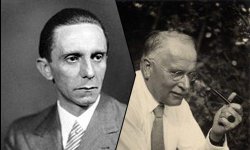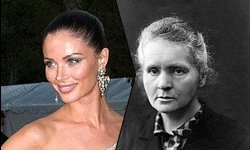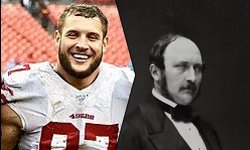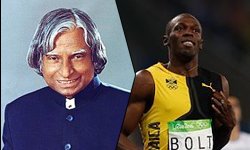BioGraph
Connecting Pocahontas and Alan Turing
Pocahontas
* ''The New World'' (2005), film directed by Terrence Malick and starring Q'orianka Kilcher as Pocahontas
Terrence Malick
After a disagreement with his advisor, Gilbert Ryle, over his thesis on the concept of world in Kierkegaard, Heidegger, and Wittgenstein, Malick left Oxford without a degree.
Ludwig Wittgenstein
Austrian-British philosopher (1889–1951)
influenced = Ambrose, Anscombe, Agamben, Asad, Baker, Bauer, Bernstein, Biletzki, Black, Bloor, Bouveresse, Bouwsma, Bourdieu, Brandom, Cage, Carnap, Cavell, Chappell, Chomsky, Conant, Crary, Danto, Das, Davidson, Dennett, Diamond, Dummett, Feyerabend, Foot, Postanalytic philosophy, Fosse, Garcia, Glendinning, Glock, Goldfarb, Gowers, Granger, Habermas, Hacker, Hacking, Hadot, Hart, Hauerwas, Heyes, Horwich, Jaeggi, Johns, Kompridis, Korzybski, Kosuth, Kripke, Kuhn, Kukla, Laugier, Lear, Lewy, Lyotard, MacIntyre, Malcolm, Margolis, McDowell, Moi, Monk, A. W. Moore, G. E. Moore, Morris, Mouffe, Mulhall, Murdoch, Nauman, Nyíri, Paolozzi, Perloff, Pitkin, Putnam, Ramsey, Read, Reich, Rhees, Rodowick, Rorty, Rosch, Russell, Ryle, Sandis, Scarry, Scheman, Searle, Sellars, Skinner, Sluga, Strawson, Taylor, Toulmin, Tully, Turing, Vienna Circle, Vuillemin, Waismann, Weitz, Wellmer, B. Williams, M. Williams, Winch, Wisdom, Wright, von Wright
He gave a series of lectures on mathematics, discussing this and other topics, documented in a book, with lectures by Wittgenstein and discussions between him and several students, including the young Alan Turing who described Wittgenstein as ''"a ''very'' peculiar man"''.
Pocahontas
On January 5, 1617, she and Tomocomo were brought before the king at the old Banqueting House in the Palace of Whitehall at a performance of Ben Jonson's masque ''The Vision of Delight''.
Ben Jonson
17th-century English playwright, poet, and actor
William Drummond reports that during their conversation, Jonson scoffed at two apparent absurdities in Shakespeare's plays: a nonsensical line in '' Julius Caesar'' and the setting of '' The Winter's Tale'' on the non-existent seacoast of Bohemia.
Julius Caesar (play)
* '' Julius Caesar'' (BBC/Time-Life TV, 1978), a television adaptation in the BBC Television Shakespeare series, directed by Herbert Wise and produced by Cedric Messina, starring Richard Pasco as Brutus, Keith Michell as Antony and Charles Gray as Caesar.
Herbert Wise
He directed several made-for-TV films, including ''Skokie'' (1981) and '' Breaking the Code'' (1996), the latter adapted from the Hugh Whitemore play about Alan Turing.
Pocahontas
* Sedgeford Hall Portrait – once thought to represent Pocahontas and Thomas Rolfe but now believed to depict the wife (Pe-o-ka) and son of Seminole Chief Osceola
Howard Zinn
In the opinion of Noam Chomsky, ''The Logic of Withdrawal'' was Zinn's most important book:<blockquote>"He was the first person to say—loudly, publicly, very persuasively—that this simply has to stop; we should get out, period, no conditions; we have no right to be there; it's an act of aggression; pull out.
Along with Noam Chomsky, Zinn edited and annotated the copy of ''The Pentagon Papers'' that Senator Mike Gravel read into the Congressional Record and that was subsequently published by Beacon Press.
Zinn also took part in the 1971 May Day protests (with among others Noam Chomsky and Daniel Ellsberg).
*''The Cold War & the University: Toward an Intellectual History of the Postwar Years'' (Noam Chomsky (Editor) Authors: Ira Katznelson, R. C. Lewontin, David Montgomery, Laura Nader, Richard Ohmann, Ray Siever, Immanuel Wallerstein, Howard Zinn (1997) {{ISBN|978-1-56584-005-8}}.
Noam Chomsky
{{collapsible list| title = Academic | J. L. Austin, William Chomsky, C. West Churchman, René Descartes, Galileo, Nelson Goodman, Morris Halle, Zellig Harris, Wilhelm von Humboldt, David Hume, Roman Jakobson, Immanuel Kant, George Armitage Miller, Pāṇini, Hilary Putnam, W. V. O. Quine, Bertrand Russell, Ferdinand de Saussure, Marcel-Paul Schützenberger, Alan Turing, Ludwig Wittgenstein
Pocahontas
According to colonist William Strachey, "Pocahontas" was a childhood nickname meaning "little wanton"; some interpret the meaning as "playful one." In his account, Strachey describes her as a child visiting the fort at Jamestown and playing with the young boys; she would "get the boys forth with her into the marketplace and make them wheel, falling on their hands, turning up their heels upwards, whom she would follow and wheel so herself, naked as she was, all the fort over."
Kocoum's identity, location, and very existence have been widely debated among scholars for centuries; the only mention of a "Kocoum" in any English document is a brief statement written about 1616 by William Strachey in England that Pocahontas had been living married to a "private captaine called Kocoum" for two years.
William Strachey
Strachey produced two more versions during the next six years, dedicating one to Francis Bacon and the other to Sir Allen Apsley.
Francis Bacon
During the 18th-century French Enlightenment, Bacon's non-metaphysical approach to science became more influential than the dualism of his French contemporary Descartes, and was associated with criticism of the ''Ancien Régime''.
René Descartes
French philosopher, mathematician, and scientist (1596–1650)
Descartes believed that the brain resembled a working machine and unlike many of his contemporaries, he believed that mathematics and mechanics could explain the most complicated processes of the mind.{{Citation needed|reason= This claim seems in conflict with Descartes' idea that the mind is a different substance that does not follow mechanistic laws|date=August 2021}} In the 20th century, Alan Turing advanced computer science based on mathematical biology as inspired by Descartes.







